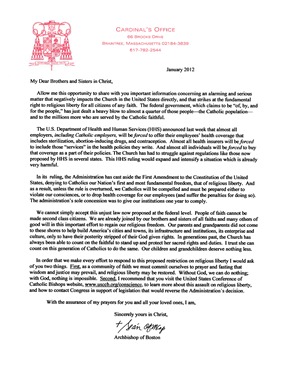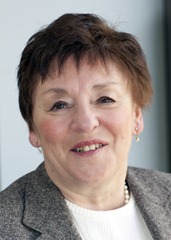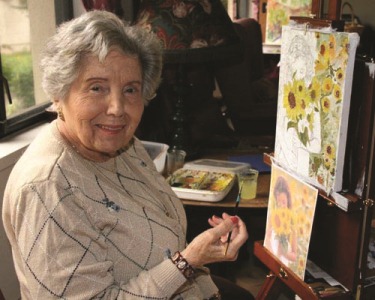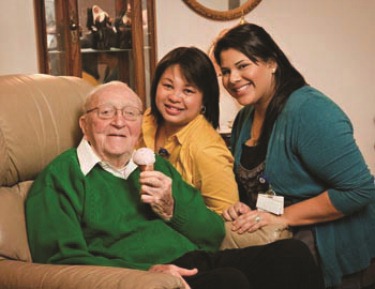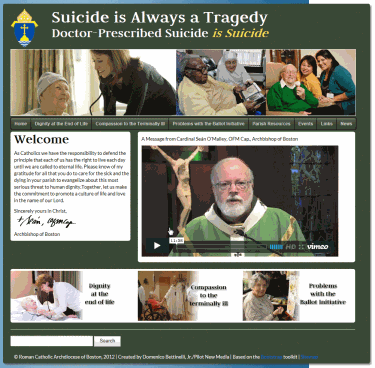Hello again!
This week, I am visiting Papua New Guinea for the ordination of the new bishop of the Diocese of Mendi, Bishop Donald Lippert. Don is one of my oldest and dearest Capuchin friends. I’ve known him many years and, in fact, he was the first priest I ordained after becoming a bishop. As I say, you know you are getting long in the tooth when a man you ordained a priest becomes a bishop!

As you read this we will still be in the midst of the ordination events, so I’ve decided to save the details and the rest of my photos of my trip for next week.
Instead, I want to share with you some information on some items that I think all Catholics should be made aware of.
I want to begin with a message to all the faithful of the Archdiocese of Boston that I released earlier this week:
My Dear Brothers and Sisters in Christ,
Allow me this opportunity to share with you important information concerning an alarming and serious matter that negatively impacts the Church in the United States directly, and that strikes at the fundamental right to religious liberty for all citizens of any faith. The federal government, which claims to be by, and for the people,” has just dealt a heavy blow to almost a quarter of those people — the Catholic population — and to the millions more who are served by the Catholic faithful.
The U.S. Department of Health and Human Services (HHS) announced last week that almost all employers, including Catholic employers, will be forced to offer their employees health coverage that includes sterilization, abortion-inducing drugs, and contraception. Almost all health insurers will be forced to include those “services” in the health policies they write. And almost all individuals will be forced to buy that coverage as a part of their policies. The Church has had to struggle against regulations like those now proposed by HHS in several states. This HHS ruling would expand and intensify a situation which is already very harmful.
In its ruling, the Administration has cast aside the First Amendment to the Constitution of the United States, denying to Catholics our Nation’s first and most fundamental freedom, that of religious liberty. And as a result, unless the rule is overturned, we Catholics will be compelled and must be prepared either to violate our consciences, or to drop health coverage for our employees (and suffer the penalties for doing so). The administration’s sole concession was to give our institutions one year to comply.
We cannot simply accept this unjust law now proposed at the federal level. People of faith cannot be made second class citizens. We are already joined by our brothers and sisters of all faiths and many others of good will in this important effort to regain our religious freedom. Our parents and grandparents did not come to these shores to help build America’s cities and towns, its infrastructure and institutions, its enterprise and culture, only to have their posterity stripped of their God given rights. In generations past, the Church has always been able to count on the faithful to stand up and protect her sacred rights and duties. I trust she can count on this generation of Catholics to do the same. Our children and grandchildren deserve nothing less.
In order that we make every effort to respond to this proposed restriction on religious liberty I would ask of you two things. First, as a community of faith we must commit ourselves to prayer and fasting that wisdom and justice may prevail, and religious liberty may be restored. Without God, we can do nothing; with God, nothing is impossible. Second, I recommend that you visit the United States Conference of Catholic Bishops website, www.usccb.org/conscience , to learn more about this assault on religious liberty, and how to contact Congress in support of legislation that would reverse the Administration’s decision.
With the assurance of my prayers for you and all your loved ones, I am,
Sincerely yours in Christ,
Cardinal Seán O’Malley , OFM Cap.
Archbishop of Boston
– – –
I have also asked our Secretary for Faith Formation and Evangelization, Janet Benestad, to share her reflections on a homily I have prepared for the upcoming World Day of the Sick focusing on the effort to legalize physician assisted suicide in Massachusetts. Janet is working very closely with us on our efforts to educate people on this very important issue and we are very grateful for all she is doing.
Doctor-prescribed Suicide: Bad Medicine for Massachusetts
Janet Benestad
Secretary for Faith Formation & Evangelization
On Saturday and Sunday, February 11 and 12, Catholics around the world will celebrate World Day of Sick, inaugurated by Pope John Paul II twenty years ago to pray for the sick and dying, and their caregivers. Catholics who attend Masses in the Archdiocese of Boston will hear a specially prepared homily by Cardinal Seán O’Malley on doctor-prescribed suicide. The Cardinal is speaking to all Catholics about a newly proposed law that would decriminalize assisted suicide in Massachusetts. Should the law pass, Massachusetts will become only the third state in the United States to allow doctors to write lethal prescriptions for the terminally ill at the patient’s request, the other states being Oregon and Washington.
“We are called to comfort the sick,” says Cardinal Seán, “not to help them take their own lives. As the Catholic Bishops of the United States said in their recent statement on assisted suicide: ‘True compassion alleviates suffering while maintaining solidarity with those who suffer. It does not put lethal drugs in their hands and abandon them to their suicidal impulses, or to the self-serving motives of others who may want them dead.’”
What is this new, so-called “Death with Dignity Act,” and why is the Archbishop of Boston speaking about it? If passed, the Act will allow Massachusetts residents diagnosed with a terminal disease — likely to cause death in six months — to request lethal drugs from their doctor in order to end their lives.
Right now the initiative is before the Massachusetts legislature. If the legislature does not act before May 2012, the “Death with Dignity Act” will appear on the ballot next November as a referendum. If passed, the meaning of healthcare in Massachusetts will change — from a system that treats illness, and comforts those beyond treatment, to one that accepts the possibility that some people, namely those diagnosed as terminally ill, might be better off dead!
Proponents of the law want citizens of Massachusetts to believe that this is a compassionate response to the plight of terminally ill patients. People who support the law say that fear of the dying process, abandonment, and loss of control warrant a mechanism to allow people who are dying anyway to choose the time and manner of their death. These are powerful arguments. But, says the Cardinal, none of them justifies suicide.
First, he says, compassion by its very nature does not seek the elimination of the person who is suffering. Suicide, even done in the name of compassion, eliminates the person and results in great suffering for those left behind. Saying that we should entertain a request for suicide goes against the strongest instincts of good people to care for the sick and dying and to safeguard their need for dignity, support, privacy and love. Second, suicide does not promote true human autonomy and control. In fact, it is a choice to end all choices. And, this proposed law will create a legal standard in Massachusetts that views certain persons — those who are terminally ill — as less valuable than others. It will become legal to facilitate their deaths, rather than to seek to prevent them.
A further complication of the proposed law is that it is fraught with incidental dangers. While it requires two doctors to say that a patient is mentally capable of requesting lethal drugs, it does not require a psychiatric evaluation. While it requires two witnesses to say the patient is capable of making decisions, the witnesses may be total strangers to the patient and at least one may be the patient’s heir. In fact, an heir and a total stranger may testify to a patient’s mental capacity. Depressed individuals may be cleared to receive the lethal medications, which may be taken at the time they are prescribed or kept indefinitely with no controls over their use or disposal. It is recommended, but not required, that patients requesting lethal drugs notify relatives. A young adult may be diagnosed as terminal, and receive lethal medication—all without notification of his or her parents. The prescribing doctor may not be present at the death; in fact, no one need be present at all. And, the death certificate cannot list lethal drugs as the cause of death but, instead, must list the underlying disease.
Make no mistake. Even if safeguards against these dangers where in place, suicide is still a tragedy and something that should be opposed by responsible citizens. Nevertheless, the law as it stands will almost certainly create pressure on the terminally and incurably ill to see their lives as burdens. Given the stress on the economic and medical systems in our nation, it is possible that care at the end of life, under this law, will deteriorate quickly for those with terminal diagnoses into the cheaper, easier course of taking legal drugs. A woman in Oregon, where assisted suicide was passed in 1994, received a letter from Oregon State Health Insurance saying that her insurance would pay for lethal drugs, but would not cover her chemotherapy, even though she had never requested assistance with suicide.
As Catholics, we have a more excellent way to prepare for death. We believe that death is the doorway to eternal life and that a life well-lived is the best preparation for what the ancient prayers call a “happy death.” For Catholics, hope is not limited to this world alone. We see our role as caregivers to the dying — we walk the journey with the sick and incurably ill, comfort them, relieve their pain, respect their dignity and surround them with profound love. We see caregivers as keepers of a sacred trust — to guard and keep the sick and the dying each day as well as possible until the moment when they die.
Still, there are practical reasons why doctor-prescribed suicide has so much support these days. People fear overtreatment and its debilitating and burdensome effects. They fear pain, dementia, and other conditions that accompany the dying process. Catholics often misunderstand their own responsibilities when faced with a terminal disease. They think that they must refuse pain-killing drugs. In this they are mistaken. Catholic directives clearly state that a sick person may have as much medication as needed to alleviate pain, even if the drugs hasten death. Also, a person may refuse any treatment that is deemed burdensome or likely to have no benefit. For example, an elderly person diagnosed with cancer may forego chemotherapy. Even food and water, which are considered ordinary treatments and may not be withdrawn in order to bring about death, may be removed if they are burdensome or without benefit. For example, a gastrointestinal tube that causes repeated infections may be withdrawn.
Cardinal Seán is eager to educate Catholics in Massachusetts against the false arguments and pretenses of those who promote legalized suicide. The bill itself does not even use the word “suicide.” Proponents of the bill talk about “aid in dying” or A-I-D! Massachusetts residents who signed the petition before it could go before the legislature were told that they were supporting “compassion for the terminally ill.” In fact, the major organization behind this effort recently changed its name from the Hemlock Society to the euphemistic “Compassion and Choices.”
Cardinal Seán is calling Catholics to be “leaders in the effort to defend and uphold the principle that each of us has a right to live with dignity through every day of our lives . . .” He is asking them “. . . to join with other concerned citizens, including disability rights advocates and members of the healing professions, to stand for the dignity of people with serious illnesses and disabilities and promote life-affirming solutions for their hardships.” He is calling upon the members of the healing professions to resist the temptation to resort to a “quick fix of an overdose of drugs” in favor of the ancient oath of the true healing professional: “I will not give a lethal drug to anyone, nor will I advise such a plan.”
When you attend Mass on February 11 or 12, please listen carefully to Cardinal Seán’s World Day of the Sick homily and read the materials that will be distributed in your parish. A specially prepared in-pew card will help you to follow along as the Cardinal lays out the reasons why suicide is always a tragedy, even when it is done to relieve pain and suffering.
Visit our website www.suicideisalwaysatragedy.org to preview Cardinal Seán’s homily and to get more information on this grotesque threat to the elderly and the sick. Finally, pray for the sick and dying and for their caregivers. Visit the sick, which is one of the corporal works of mercy. Pray that people in the medical and legal professions, and that all citizens of Massachusetts, will resist this new threat to the dignity of all persons. As Cardinal Seán says, “A vote for doctor-prescribed suicide is a vote for suicide!”
The proposed new law is little more than an illusion born of a false sense of human autonomy. As modern medicine became more and more effective, we were tempted to put off death by using every therapy available to delay it and, sometimes, in so doing, to cause misery to patients from which any reasonable person naturally recoils. To remedy that situation, we now are tempted to hasten death, or to determine for ourselves, and by ourselves, when to die in order to avoid the uncertainty and dependence of created beings. But created beings we are! There is no escaping our dependency on God ultimately, and on others to care for us in our most vulnerable state.
Know that our society will be judged by the way in which we care for, or fail to care for, the sick, the terminally ill and dying. As Blessed John Paul II said, “True compassion leads to sharing another’s pain; it does not kill the person whose suffering we cannot bear” (The Gospel of Life, no. 66). On this World Day of the Sick, let us join with those among us who are ill and particularly those who are near the end of life to share their burden, to relieve their suffering, to comfort them and to build a civilization of love—a love that overcomes even death!
– – –
Finally, as you know, this week was Catholic Schools Week and all the schools in our archdiocese celebrated with numerous events and commemorations that highlight the important contributions of Catholic schools to the students, their families, and to all of society.
I am pleased the Scot Landry, Secretary for Catholic Media; Mary Grassa O’Neill, Secretary for Education; and their teams were able to collaborate on a series of four radio broadcasts on The Good Catholic Life show, highlighting some of our Catholic schools.
On Monday, Scot was joined by Father Paul O’Brien, Pastor of St. Patrick Parish in Lawrence, and Sister Lucy Veilleux, Principal of Lawrence Catholic Academy, which is only two years old, but builds on more than 100 years of Catholic education in Lawrence. They discussed the challenges they face in the poorest city in Massachusetts, where 75 percent of children come from single-parent homes and the crime rate is skyrocketing. While the public school system has been placed in receivership by the state, Lawrence Catholic Academy has a 100 percent graduation rate. They reveal the secrets to their success, as well as the excellent work they’ve done in bringing together two parochial schools with long traditions of their own into one school in a very short period of time.
Father Paul O’Brien, Sister Lucy Veilleux and Scot Landry from Lawrence Catholic Academy
On Tuesday, Scot and Father Chris O’Connor interviewed Father Michael Drea, Pastor of St. Paul Parish in Cambridge, and William McIvor and John Robinson, headmaster and music director, respectively, of the Boston Archdiocesan Choir School. While boys’ choir schools are a very old tradition in the Church dating back hundreds of years, our archdiocesan choir school is the only one of its kind left in the United States. This unique school not only provides the boys in grades 5 through 8 with a college-level music theory education and musical skills including singing, piano, and handbells, they also ensure the students receive a superior academic education as well. The boys sing at Masses at St. Paul’s every Tuesday through Sunday, and if you’re ever in Cambridge, you owe it to yourself to attend one of these Masses.
Father Michael Drea, John Robinson and Bill McIvor from the Boston Archdiocesan Choir School
Wednesday Scot and Father Matt Williams then interviewed Dr. John McEwan and Cathy Demers, President and Head of the Religion Department, respectively, at Cardinal Spellman High School in Brockton. When one in six students are members of the school’s liturgical choir and when students call the all-school Masses the “cool” event of the week, it’s obvious there is something special going on at this school. Many priests speak of how wonderful it is to celebrate Mass at Cardinal Spellman and I hear there is even a waiting list for celebrants! The spiritual fervor is matched by academic excellence and Cardinal Spellman High School is on the cutting edge of technology. They have announced a new Apple iPad initiative that will put one of these amazing devices in the hands of every teacher and student, opening up the possibility of replacing bulky, expensive, and quickly outdated textbooks with ebooks, apps, and more innovations that haven’t even been imagined yet. They are the first Catholic school to take this step and second only to Burlington High School in Massachusetts.
Dr. John MacEwan and Cathy Demers from Cardinal Spellman join Scot Landry
On Friday, Scot, Mary, and Jim Walsh, Associate Superintendent for Administration and Finance, wrapped up Catholic Schools Week as they talked about how the Catholic Schools Office is working with all the schools to strengthen Catholic identity, heighten academic excellence, and improve financial vitality to ensure a vigorous future for Catholic education in our archdiocese.
 Mary Grassa O’Neill, Superintendent of Schools, joins Father Mark O’Connell and Scot Landry
Mary Grassa O’Neill, Superintendent of Schools, joins Father Mark O’Connell and Scot Landry
Until next week,
Cardinal Seán

